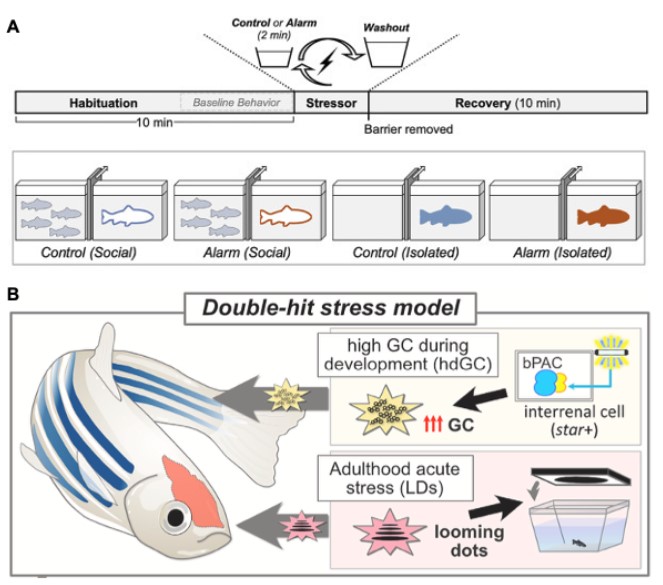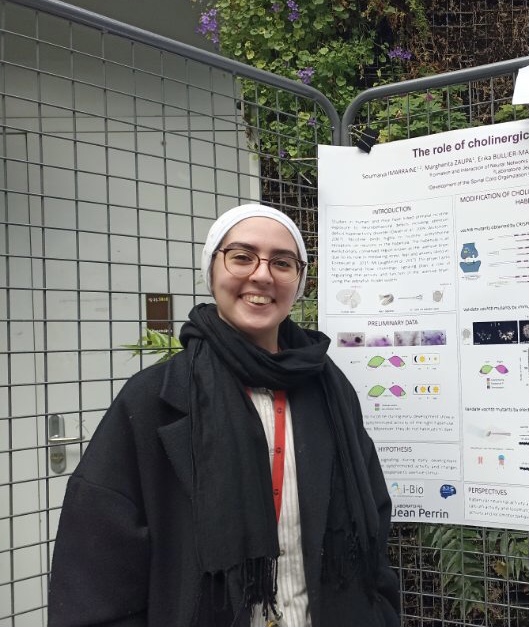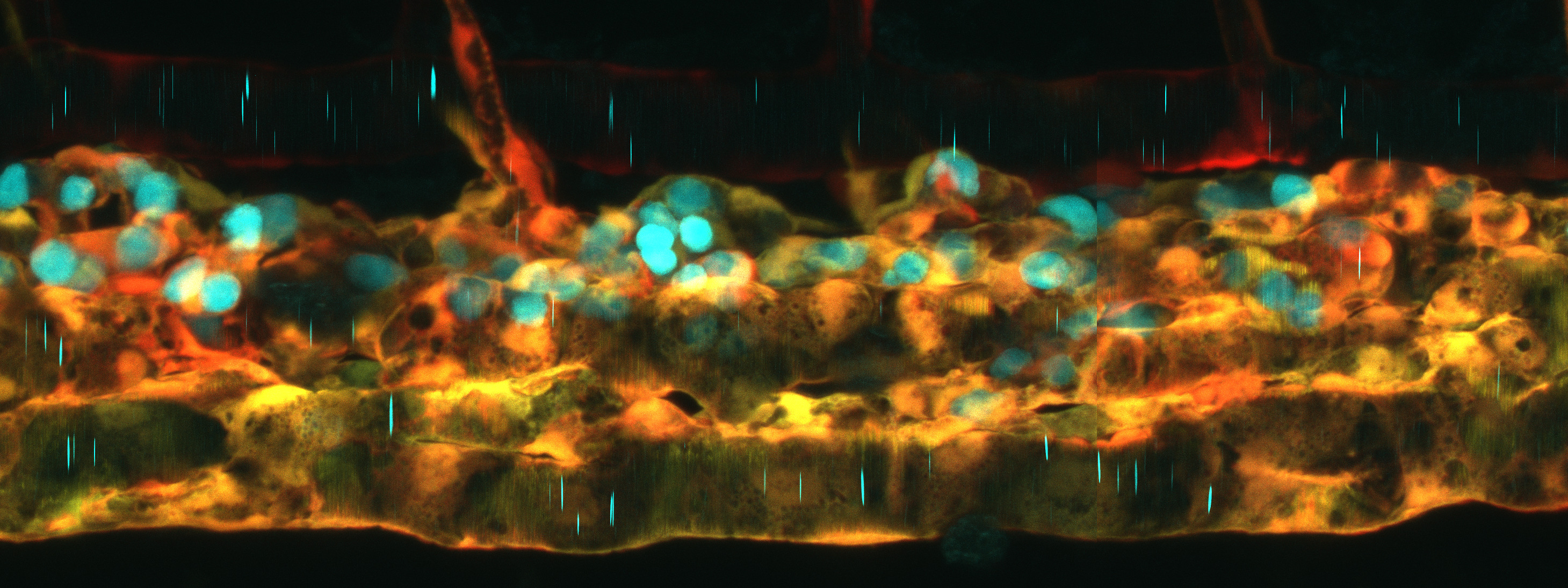Science Spotlight - Stress
Growing up stressed, leaning on friends: zebrafish and the balance of stress
By Dr. Soumaiya Imarraine
Stress affects all animals, and various factors determine how well they deal with it. Two notable examples are social environment and past experiences of stress. Social interactions can significantly reduce stress responses; this calming effect is known as "social buffering." In mammals, oxytocin is largely responsible for this process1. On the other hand, experiencing stress early in life can increase sensitivity to stressful conditions encountered later in life. In fish, the stress response is regulated by a neuroendocrine system called the Hypothalamic-Pituitary-Interrenal axis. When fish encounter a stressor, this system releases glucocorticoids2. Elevated glucocorticoid levels during development can lead to long-term changes in stress regulation and behavior well into adulthood3. Recently, two studies by Leah Wilson et al. and Min-Kyeung Choi et al. have explored how social environments and early life stress shape the stress responses in adult zebrafish4,5.
Wilson and colleagues investigated how social interactions and oxytocin receptors modulate recovery from acute stress in adult zebrafish. They exposed both male and female zebrafish to an alarm substance, in this case a chemical released when fish skin is damaged, which triggers fear or anxiety in other fish. Wilson and colleagues added the alarm substance to a tank housing a single fish. To measure how well fish recovered from stress exposure, the researchers then transferred the fish to a tank divided with a see-through barrier that allowed it fish to see a shoal of fish placed on the far side of the barrier. Then they measured the position and movement of the single fish (stressed fish tend to shelter at the bottom of the tank and move less).
Fish that could see the shoal were found to recover from stress more quickly than fish that were similarly stressed in the absence of a shoal of conspecifics on the other side of the barrier. However, when fish were injected with a drug that blocked oxytocin receptors, this social buffering effect was impaired. This suggests that, just like in mammals, oxytocin plays an important role in how zebrafish handle stress when they are in a social environment. However, Wilson noted some differences in how oxytocin functions across species: “In mammals, it looks like oxytocin both promotes grouping and also directly suppresses stress responses. Our data suggests that in zebrafish, oxytocin does also promote grouping, but it might not directly suppress stress responses in the same way. It might do so indirectly, by changing social behavior. […] That was surprising, the indirect relationship between oxytocin and stress, going through behavior, as opposed to directly suppressing the Hypothalamic-Pituitary-Interrenal axis, which we think it does in some rodents”.
In the other study, Choi and colleagues focused on how exposure to stress during early development affects zebrafish later in life. Specifically, they looked at the effects of high glucocorticoid levels during the early stages of development. To do this, they used a transgenic zebrafish line they created, called Tg(star:bPAC-2A-tdTomato)uex300, in which they could optogenetically raise glucocorticoid levels by exposing the fish to blue light during their larval and juvenile stages. Once the fish reached adulthood, Choi and colleagues triggered acute stress using a looming dot—a visual stimulus known to cause a fear response by mimicking an approaching predator. They found that compared to controls zebrafish exposed to high glucocorticoid levels when they were younger showed higher levels of cortisol when faced with this predator simulation. These fish also experienced raised cortisol levels during routine handling, suggesting a general heightened sensitivity to stress.
The early exposure to glucocorticoids also caused long-term transcriptional changes. Some genes, particularly those involved in the acute stress response or in epigenetic regulation, remained altered well into adulthood. Remarkably, even the offspring of these stressed fish—who hadn’t been exposed to elevated glucocorticoid levels themselves—showed similar changes in gene expression and behavior. Choi was particularly surprised by this transgenerational effect, saying “The most surprising result is the transgenerational effect. [It] is much stronger than I expected.”
Wilson’s research underscores the importance of considering the social environment, not just in behavioral research, but also in daily zebrafish husbandry, something mammalian researchers have known for decades. Says Wilson: “We've come a long way from thinking that we can isolate an animal from conspecifics or from environmental complexity without any neural or behavioral consequences. And I think we're sort of catching up in the fish world.”
At the same time, Choi’s findings point to the long-term impact of stress experienced early in life. By identifying genes that remain altered due to high glucocorticoid levels during development, his research offers new insights into why early life stress increases vulnerability to stress-related disorders. The zebrafish model could be an excellent tool for pinpointing critical developmental periods when stress has the greatest impact on stress susceptibility in adulthood. Understanding how early life stress affects not only the individual but potentially future generations could help researchers study the epigenetic pathways involved in stress-related mental health issues.
Together, the work of Wilson and Choi bring a deeper understanding of what shapes stress sensitivity and recovery, offering valuable guidance for both behavioral research and zebrafish husbandry. These findings may also have broader implications for understanding how stress-related psychiatric disorders develop in humans.

A. Wilson and colleagues test the locomotor recovery of adult zebrafish following exposure to a control solution or an alarm substance, in isolation or in the presence of a shoal. From Wilson et al., 2024.
B. Choi and colleagues investigate the influence of early life stress using a double hit stress mode where fish are exposed to high levels of glucocorticoids during development through optogenetic activation of the Hypothalamic-Pituitary-Interrenal axis, followed by exposure to a looming stimulus during adulthood. From Choi et al., 2024.
References
1 Hennessy, M. B., Kaiser, S., & Sachser, N. (2009). Social buffering of the stress response: Diversity, mechanisms, and functions. Frontiers in Neuroendocrinology, 30(4), 470–482. https://doi.org/10.1016/j.yfrne.2009.06.001
2 Wendelaar Bonga, S. E. (1997). The stress response in fish. Physiological Reviews, 77(3), 591–625. https://doi.org/10.1152/physrev.1997.77.3.591
3 Lupien, S. J., McEwen, B. S., Gunnar, M. R., & Heim, C. (2009). Effects of stress throughout the lifespan on the brain, behaviour and cognition. Nature Reviews Neuroscience, 10(6), 434–445. https://doi.org/10.1038/nrn2639
4 Wilson, L. C., Riordan, A., Nussbaum, A., & Krawitz, J. (2024). Heart and shoal: Social cues and oxytocin receptors impact stress recovery in the zebrafish. Physiology & Behavior, 283, 114613. https://doi.org/10.1016/j.physbeh.2024.114613
5 Choi, M.-K., Cook, A., Mungikar, K., Eachus, H., Tochwin, A., Linke, M., Gerber, S., & Ryu, S. (2024). Exposure to elevated glucocorticoid during development primes altered transcriptional responses to acute stress in adulthood. iScience, 27(7), 110160. https://doi.org/10.1016/j.isci.2024.110160
About the Science Spotlight Writer
 Dr. Soumaiya Imarraine recently earned her PhD from Sorbonne University (France) in laboratory Neuroscience Paris Seine and laboratory Jean Perrin. She is interested in exploring the neural correlates of behavior in zebrafish.
Dr. Soumaiya Imarraine recently earned her PhD from Sorbonne University (France) in laboratory Neuroscience Paris Seine and laboratory Jean Perrin. She is interested in exploring the neural correlates of behavior in zebrafish.
 Dr. Leah C. Wilson is an Assistant professor at Muhlenberg College (USA) where she combines her passions for teaching and research. Her lab focuses on the neural mechanisms that regulate social behavior in zebrafish, and more particularly the role of oxytocin in the regulation of social behavior.
Dr. Leah C. Wilson is an Assistant professor at Muhlenberg College (USA) where she combines her passions for teaching and research. Her lab focuses on the neural mechanisms that regulate social behavior in zebrafish, and more particularly the role of oxytocin in the regulation of social behavior.
 Dr. Min-Kyeung Choi is a postdoctoral fellow in Professor Soojin Ryu’s lab at the Living Systems Institute (University of Exeter, UK). His research focuses on how early life stress affects adult brain functions and behavior, with a special interest in genomics and epigenetics.
Dr. Min-Kyeung Choi is a postdoctoral fellow in Professor Soojin Ryu’s lab at the Living Systems Institute (University of Exeter, UK). His research focuses on how early life stress affects adult brain functions and behavior, with a special interest in genomics and epigenetics.




